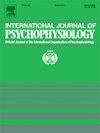The dynamic transfer of adaptive control in task switching: Event-related potential evidence
IF 2.6
3区 心理学
Q3 NEUROSCIENCES
引用次数: 0
Abstract
Adaptive control refers to the dynamic regulation of cognitive processes in response to changing environmental demands. Previous studies demonstrated that the proportion of task switches or response variations can induce adaptive control. However, the extent to which adaptive control is transferred across different contexts remains poorly understood. The present study employed a confound-minimized design comprising two inducer contexts (one with 100 % response repeats and the other with 100 % response changes within a series of task-repeat trials preceding task-switch trials) and a diagnostic list with 50 % response changes. Event-related potentials (ERP) results revealed that: (1) both cue-locked switch-related positivity and stimulus-locked switch-related negativity were attenuated in the response-change inducer context compared to the response-repeat inducer context; and (2) in the diagnostic list, the influence of the inducer context was exclusively observed in the cue-locked P3 component. These results indicate that adaptive control triggered by the high frequency of response changes during task-repetition trials can be transferred to a different context and can modulate the proactive control of task switching in the new context.
任务切换中自适应控制的动态迁移:事件相关的潜在证据。
自适应控制是指认知过程对环境需求变化的动态调节。以往的研究表明,任务切换或反应变化的比例可以诱导自适应控制。然而,适应性控制在不同背景下的转移程度仍然知之甚少。本研究采用最小化混淆设计,包括两个诱导上下文(一个具有100% %的反应重复,另一个在任务切换试验之前的一系列任务重复试验中具有100% %的反应变化)和一个具有50% %反应变化的诊断列表。事件相关电位(ERP)结果显示:(1)与反应-重复诱导相比,在反应-改变诱导情境下,提示锁定开关相关的正性和刺激锁定开关相关的负性均有所减弱;(2)在诊断列表中,诱导剂上下文的影响仅在线索锁定的P3组分中观察到。这些结果表明,任务重复实验中高频率的反应变化触发的自适应控制可以转移到不同的情境中,并可以调节新情境中任务切换的主动控制。
本文章由计算机程序翻译,如有差异,请以英文原文为准。
求助全文
约1分钟内获得全文
求助全文
来源期刊
CiteScore
5.40
自引率
10.00%
发文量
177
审稿时长
3-8 weeks
期刊介绍:
The International Journal of Psychophysiology is the official journal of the International Organization of Psychophysiology, and provides a respected forum for the publication of high quality original contributions on all aspects of psychophysiology. The journal is interdisciplinary and aims to integrate the neurosciences and behavioral sciences. Empirical, theoretical, and review articles are encouraged in the following areas:
• Cerebral psychophysiology: including functional brain mapping and neuroimaging with Event-Related Potentials (ERPs), Positron Emission Tomography (PET), Functional Magnetic Resonance Imaging (fMRI) and Electroencephalographic studies.
• Autonomic functions: including bilateral electrodermal activity, pupillometry and blood volume changes.
• Cardiovascular Psychophysiology:including studies of blood pressure, cardiac functioning and respiration.
• Somatic psychophysiology: including muscle activity, eye movements and eye blinks.

 求助内容:
求助内容: 应助结果提醒方式:
应助结果提醒方式:


